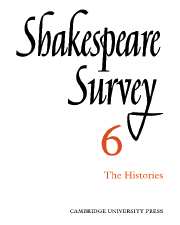Book contents
- Frontmatter
- Shakespeare's History plays: 1900-1951
- The Unity of 2 Henry IV
- Anticipation and Foreboding in Shakespeare’s Early Histories
- Middle-Class Attitudes in Shakespeare’s Histories
- A Reconsideration of Edward III
- On Producing Henry VI
- The Huntington Library
- An Early Elizabethan Playhouse
- Shakespeare Learns the Value of Money: The Dramatist at Work on Timon of Athens
- Shakespeare’s French Fruits
- An Elizabethan Eyewitness of Antony and Cleopatra?
- Othello’s “It is the cause . . .”: An Analysis
- On Translating Hamlet
- Shakespeare in China
- International Notes
- Shakespeare Productions in the United Kingdom: 1951
- Shakespeare’s History Plays - Epic or Drama?
- Festival Shakespeare in the West End
- The Year's Contributions to Shakespearian Study 1 Critical Studies
- 2 Shakespeare’s Life, Times and Stage
- 3 Textual Studies
- Books Received
- Index
- Plate Section
Shakespeare’s French Fruits
Published online by Cambridge University Press: 28 March 2007
- Frontmatter
- Shakespeare's History plays: 1900-1951
- The Unity of 2 Henry IV
- Anticipation and Foreboding in Shakespeare’s Early Histories
- Middle-Class Attitudes in Shakespeare’s Histories
- A Reconsideration of Edward III
- On Producing Henry VI
- The Huntington Library
- An Early Elizabethan Playhouse
- Shakespeare Learns the Value of Money: The Dramatist at Work on Timon of Athens
- Shakespeare’s French Fruits
- An Elizabethan Eyewitness of Antony and Cleopatra?
- Othello’s “It is the cause . . .”: An Analysis
- On Translating Hamlet
- Shakespeare in China
- International Notes
- Shakespeare Productions in the United Kingdom: 1951
- Shakespeare’s History Plays - Epic or Drama?
- Festival Shakespeare in the West End
- The Year's Contributions to Shakespearian Study 1 Critical Studies
- 2 Shakespeare’s Life, Times and Stage
- 3 Textual Studies
- Books Received
- Index
- Plate Section
Summary
…a book the sprightly raciness of which none can deny… the testament of an age when…a sense of colour and character pervaded all, man-of-action and man-of-letters, so that every gallant is half a poet and every poet half a swasher. On this common ground of courageous merriment they all met; and there it is that Shakespeare and Eliot might have boused together and amused themselves with the chatter and febrile rages of Doll Tearsheet, and by their side some roaring Alsatian bravo…
Jack Lindsay, Forword to The Parlement of PrattlersJohn Eliot's picaresque life certainly accords with the most colourful notions of the Elizabethan author. A Warwickshire man, like Shakespeare, who was two years his junior, he spent some time at Brasenose, Oxford, one of the generation of university wits; subsequently, through most of the 1580's, he studied, taught and roamed from place to place in France, Italy and perhaps Spain. A schoolmaster, a hack journalist, a novice for monkhood who was released without taking his vows, he was somehow mixed up in French politics (possibly as a secret agent) and on the assassination of Henri III in 1589 found it expedient to return to his native country. During the next four years Eliot was in London, teaching French in rivalry with the Huguenot refugees and translating political tracts from across the Channel for Wolfe, the bookseller who specialized in French affairs.
- Type
- Chapter
- Information
- Shakespeare Survey , pp. 79 - 90Publisher: Cambridge University PressPrint publication year: 1953

